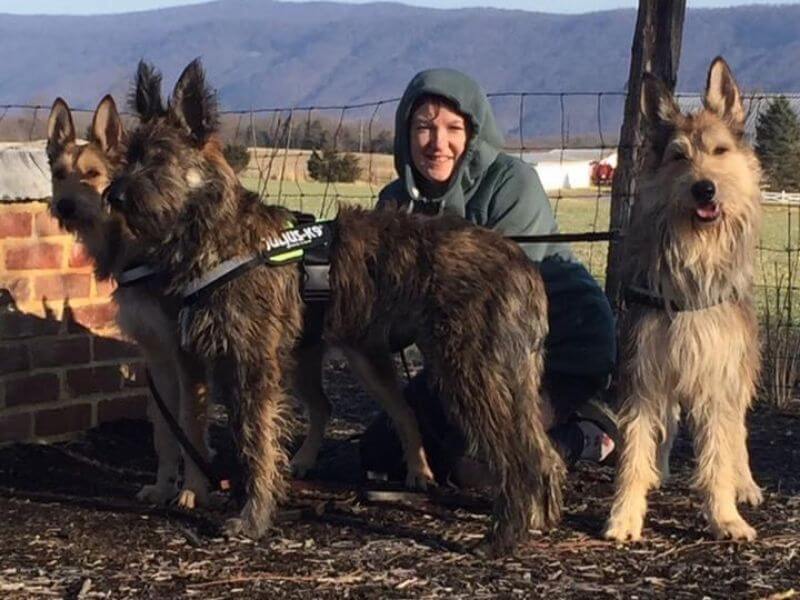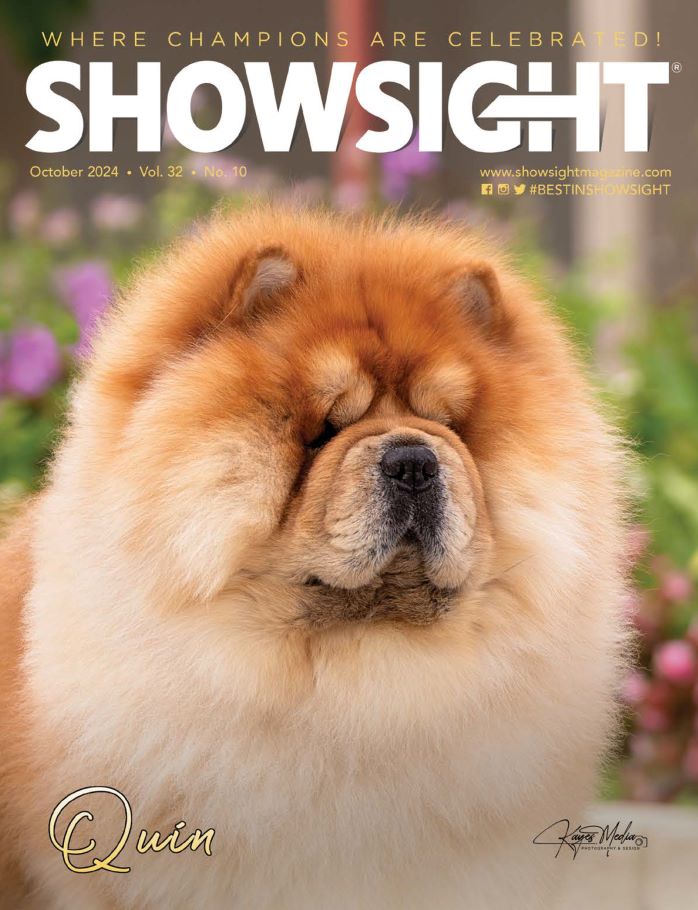Interview with Michele Fitzgerald, Breeder of Flywire Berger Picards
Please tell us a little bit about yourself. Where do you live? What is your breed? What is your kennel name? Do you have a website? How long have you been in dogs? How long have you been breeding dogs? Who are some of your best-known dogs?
Michele Fitzgerald: We live in the beautiful Shenandoah Valley in Virginia on six acres. We currently share our home with five Berger Picards and two Ibizan Hounds. Our kennel name is Flywire. We are AKC Breeders of Merit and have mentored many newcomers to the breed and to dog sports, to get them out there and do stuff with their Picards. All of our puppies have been placed by word of mouth or through networking with other breeders. We owner-handle, and several of our Picards have finished through the Bred-By Class to their Championships, and then they have fun training and competing in various other sports throughout their lives. While we don’t have a website, I can easily be reached by email at: [email protected] or on Facebook.
We had our first litter in 2009 and usually breed once a year. We have been involved in Berger Picards since 2007 when we imported our first male, “Chaudron,” from France. His father won the National Elevage that year, and we quickly took interest in sharing the breed with the fancy. Soon we had a three-pack and were traveling the country, competing in various dog sports through UKC while the breed gained recognition in AKC. In that time, I mentored under many experienced breeders and attended as many seminars as I could. I became an AKC all-breed club Show Chair and have chaired many other events. I have been active in breed and all-breed clubs ever since. There is always something new to learn, and I hope to lead by example that it is important to stay involved for the breed you love.
As a Breeder, can you share your thoughts on your breed today? Is breed type strong? Are there things to be concerned about? Are there any health-related issues? Have you worked with breeders overseas? Are pet homes typically available for your breed?
Michele Fitzgerald: Typically, when any breed comes from another country, we tend to “raise the bar” here in the States with our access to health testing. Picards are no exception. They are an extremely typey breed, but the downfall to type is that the breed as a whole has a very small gene pool. We are seeing some issues with immune-mediated diseases cropping up, such as IBD and SLO, and some issues that are particular to just this breed. Fortunately, the community as a whole is involved in researching these issues as our numbers grow. We have a fairly strong CHIC database as well as some new breeder databases to assist with pairing the best possible lines for diversity.
We are blessed to have many breeders who want to see this breed successful not only in the ring but as successful sport and home partners. I think, as a community overall, we do well with puppy placements in homes suited for the breed. There is strong interest in their looks, but some homes do not have a suitable lifestyle and most breeders will steer those folks to a more suitable breed. Therefore, there are very few in rescue, and breeders take a strong responsibility if a dog is not the right fit for a particular home.
As an Exhibitor, can you comment on recent entries in your breed? Are majors available in your area? Does your breed often participate in Companion and Performance events? How can newcomers in your breed be encouraged to join the sport of dogs?
Michele Fitzgerald: The East Coast has always had decent entries for our breed. Recently, the West Coast is seeing increased activity and some nice supported entries. Because the breed likes to work closely with its owners, there are still a fair number of owner-handled dogs and it is encouraged by breeders to get puppies enrolled in proper classes and sports as an outlet for their desire to work with you. We have encouraged participation with supported entries on a fairly regular basis. Our National’s numbers have been impressive for a breed that has not been in the AKC for more than 10 years. And as our club has grown, there is more participation in many sports.
The Berger Picard Club of America (BPCA) is working on becoming licensed to hold more events. The club recently got approval for Fast Cat, which is such a great introductory sport for pet homes, and I believe it really encourages people to try other events. Our specialty last year showcased how well-rounded Picards can be; holding events in Herding, Farm Dog, Temperament Testing, and a French-style Élevage. We also had our very first Parade of Title Holders. It was a big hit!
What are the biggest challenges facing the dog show community as a whole and how can we address them? And finally, what are some of the positive changes you’ve seen in your breed and in the dog show community as a whole over the past decade?
Michele Fitzgerald: One of the biggest challenges for the show community as a whole is teaching newcomers the VALUE in sharing their well-bred dog with the rest of the community. It is an expensive sport, and it can be difficult to explain why, as a small breed, every Picard may have an important “place” in the breed’s history. It can be a challenge to get young people involved, so it should be encouraged to share well-bred dogs with Juniors who may not be able to afford them. Yes, a lot goes into breeding, but we should take pride in carefully placing dogs with Juniors and supporting them through their journey.
Over the past decade, as a whole, breeders of Picards have taken pride in producing dogs that have taken their place in homes for the life of that pet, in dogs placing high in all-breed rankings, and in promoting the breed without changing type or temperament. Berger Picards are a truly spectacular breed that will give you their all; and we will continue to do the same for them.









